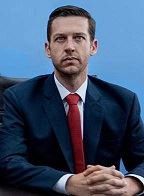How to Improve Club Bylaws
by William Dilley
Will Dilley is one of the attorneys who participated in the review of our Club's Bylaws. He will be speaking to us to answer questions about the problems he sees in our Bylaws, to give us more details about how those problems affect an organization like ours, and to suggest ways the Bylaws could be improved.
He was born and raised in Miami, Florida. In 2013, after graduating from Florida Atlantic University with a Bachelor's of Business Administration, double majoring in Management and Marketing, he earned his Juris Doctor cum laude from Nova Southeastern University, Shepard Broad College of Law.
Prior to joining The Law For All, P.A., Will represented multi-national retail giants, global logistics companies, and some of the largest insurance companies in the world. As lead Trial Attorney and head of the Litigation  Department, Will currently focuses on representing individuals, professionals and small businesses alike in claims involving fraud, deceptive trade practices, trade secret disputes, intellectual property rights, breach of contract, property disputes, construction disputes, will and trust disputes and general commercial litigation matters throughout the State of Florida.
Department, Will currently focuses on representing individuals, professionals and small businesses alike in claims involving fraud, deceptive trade practices, trade secret disputes, intellectual property rights, breach of contract, property disputes, construction disputes, will and trust disputes and general commercial litigation matters throughout the State of Florida.
Will is admitted to practice law in the State of Florida and in the United States District Court for the Southern District of Florida, and possesses diverse litigation experience in both the state and federal trial courts. Becoming a member of the team at The Law For All, P.A. has allowed Will to combine his extensive litigation experience with his passion for all things business related.
Will splits his time between Fort Lauderdale, Florida and the Florida Keys, where his family has resided for nearly thirty years. Having represented numerous corporate and insurance giants, it is his professional mission to take everything he has learned and bring effective and efficient resolutions to all of his clients' disputes with a level of creativity, outside-the-box thinking and highly personalized service that you just won't find with "big firm" representation.